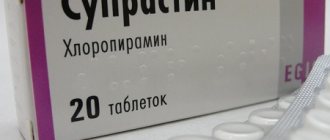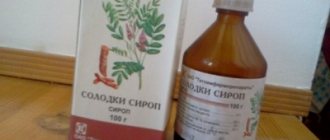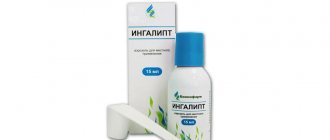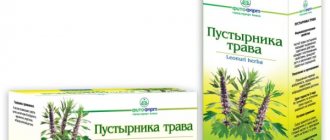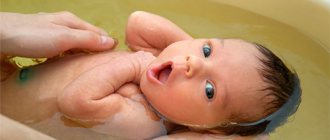Even the strongest and healthiest babies are not immune to digestive problems that lead to the development of colic in the first months of life. Fennel for newborns is a real salvation and a safe first aid. A natural product can quickly relieve unpleasant symptoms, alleviating the child’s condition. Of course, it will not speed up the development of all processes in the digestive tract and the formation of beneficial microflora, but in combination with a massage it will quickly calm the baby. You just need to learn how to brew the product and give it to your baby so that allergies or other unpleasant consequences do not occur.
Mechanism of action of the product and expected effect
Fennel is one of the relatives of the most common dill. All its parts, which have a pleasant spicy aroma, are suitable for eating and preparing medicinal decoctions. The product contains numerous vitamins, mineral components, glycosides and essential oils.
The most impressive content of substances necessary to normalize the child’s condition is found in the dried seeds, roots and grass of the plant. It is from them that it is best to prepare a decoction, infusion or tea for newborns. At the same time, you can use essential oil, which is added to the bath when bathing infants. This helps to relax the baby and prevent diaper rash.
During therapy, which is based on children's fennel tea, the following occurs:
- The spasm of the smooth muscles of the intestine, which causes severe pain, is relieved.
- Increased gas formation is eliminated. Gas bubbles burst and are eliminated naturally.
- The process of food digestion is normalized.
At the same time, the fennel drink relieves tension, calms the nervous system, and strengthens the baby’s immune defense. But, despite such pronounced positive results, it is still better to coordinate such treatment with your local pediatrician.
Treatment rules and drink recipes
Although fennel for newborns is considered a safe therapy option, it must be introduced into the toddler’s diet very carefully. In case of overdose, the baby may develop an allergic reaction in the form of an itchy rash. The product can be given to children starting from the second week of their life, limiting the first dose to half a teaspoon. The dose is gradually increased, reaching 3 teaspoons per day (1 before feeding).
Tip: Fennel is not a preventative, so you should not give it to a child who does not suffer from colic. In some cases, this may not lead to negative consequences, but we cannot exclude the possibility of a kind of addiction to the product, due to which the child’s digestion will be carried out without problems only if the tea continues to be consumed.
Brewing the product is very simple, you just need to follow one of the following schemes:
- Tea. Take 2-3 g of fennel seeds, pound them in a mortar until a homogeneous powder is obtained (you can grind them in a coffee grinder) and pour a glass of boiling water. Infuse the product for 30-60 minutes, then strain through double gauze. Add a little boiled water at room temperature so that you end up with a whole glass again.
- Decoction. Finely chop 5 g of fennel roots (fruits) and pour a glass of boiling water. Then simmer over medium heat for 2 minutes and leave covered for another 10 minutes. Next, filter the drink and cool to the desired temperature.
- Infusion. Chop the fennel herb and take one tablespoon. Pour half a glass of boiling water over it, leave for an hour, then strain and can give to the baby.
- Dill water. Despite its name, it is prepared from fennel essential oil. When converting milliliters into drops, you can seriously confuse the dosages, so it is better to initially purchase the product in finished form and store it in the refrigerator for a month. In general, to prepare the composition, use 0.05 g of essential oil, which is diluted in a liter of cooled boiled water.
It happens that the allergic response from the use of fennel appears only 4-5 days after the start of therapy. Therefore, you should not introduce new foods into the diet of the baby (and nursing mother) at this time, so as not to cause confusion with the cause of the reaction.
Common pharmaceutical drugs and their use in an integrated approach
Today, you don’t have to bother with preparing the listed drinks; you can simply purchase ready-made children’s tea or powder for preparing a medicinal solution. Products under the Hipp, Humana, and Bebivita trademarks have earned the greatest popularity and trust among mothers. Instructions for preparing the compositions are on the packaging itself. Most often, recommendations boil down to brewing a teaspoon or bag of the product in a glass of boiling water, leaving for 15-20 minutes and cooling to room temperature. The main thing is to give preference to drugs without added sugar or its analogues.
To achieve the maximum effect from treating colic, drinking fennel drinks is recommended to be combined with soothing baths with the addition of the same plant. In this case, the main component can be combined with other medicinal decoctions (chamomile, licorice, marshmallow root, wheatgrass, thyme, oregano). It is not necessary to carry out the manipulation daily; 1-2 times a week will be quite enough. The main thing is to adhere to basic technical recommendations. Take a tablespoon of all the selected ingredients, pour them into one container and pour a liter of boiling water. After a couple of hours, filter the composition and add its liquid part to the water.
All fennel products, except dill water, should be given fresh to the newborn. The drink left over after feeding the baby can be consumed by the mother. This will allow her to improve her digestion and additionally provide the baby with useful components through breastfeeding.
Pediatricians do not consider colic a disease and reassure young mothers that this phenomenon is temporary and will go away on its own by about the third or fourth month of the child’s life. But if painful attacks torment the baby after each feeding, then measures need to be taken. The benefits of fennel for newborns have been known since ancient times. Despite the abundance of medicinal drugs, today this herbaceous plant has not lost its popularity.
Benefits of fennel for children
Fennel is a herbaceous plant that looks like dill. Mentions of its use are found in the recipes of Avicenna, Hippocrates, and Dioscorides.
The beneficial properties of fennel are due to its composition. The fruits contain about 7% essential oil, as well as a large amount of vitamins B, C, PP, E.
Fennel is used for gastrointestinal diseases accompanied by spasms and colic, and also as an expectorant and diuretic.
Preparations made from this plant are used for:
- increased secretion of the digestive tract;
- improved appetite;
- normalization of the gastrointestinal tract;
- relieving muscle spasms of the intestines and stomach.
In folk medicine, the herb is used as a sedative, analgesic, choleretic and carminative. In addition, fennel tea helps cope with colic and bloating that affects newborns.
The fact is that the digestive system of infants has not yet fully adapted to the new conditions, so in the first months the baby is bothered by unpleasant sensations. For proper functioning of the intestines, beneficial microflora is necessary, the colonization of which occurs gradually. Often harmful microorganisms enter the body, causing fermentation and interfering with the normal digestion process.
Colic is common in infants between 2 weeks and 4 months of age. Occurs in 30% of children. Only in 5% are the cause of an organic disease; in other cases, their course is associated with the development of the digestive system.
Colic causes severe tummy pain in babies, but does not pose a serious danger.
Video: beneficial properties of the plant
Useful properties of fennel
Fennel's seeds are considered medicinal, although its stem is often used for making salads, and its branches are used for decorating and flavoring dishes. Most often on the shelves of pharmacies and specialty stores you can find fennel tea for newborns and nursing mothers. It relieves flatulence, colic and spasms, and also increases lactation.
What properties does this plant have and what is its mechanism of action? The seeds, and therefore fennel tea, boast the content of such valuable substances as:
- ascorbic acid;
- carotene;
- essential oils;
- vitamins E, PP, groups B, K;
- sodium, magnesium, potassium, iron, calcium, etc.
This plant does not contain irritants, so it rarely causes allergic reactions. Based on the composition and many studies that were carried out at the level of independent laboratories and universities, the following beneficial properties of fennel tea can be identified:
- antispasmodic;
- carminative;
- soothing;
- diuretic;
- bactericidal;
- anthelmintic;
- mucolytic;
- vasodilator, etc.
Fennel is a close relative of dill, but more healthy and aromatic.
Drinks made from plant seeds help the body absorb calcium, improve the functioning of the gastrointestinal tract, and strengthen the immune system. Fennel tea is effective for the following diseases:
- spastic colitis;
- flatulence;
- dyspepsia;
- gastritis;
- bronchitis;
- flu;
- weak lactation;
- diseases of the gallbladder with weak outflow of bile;
- menstrual irregularities;
- inflammatory eye diseases, etc.
Fennel is most often used for newborns. Tea made from it treats infant problems such as colic, flatulence, poor sleep, poor digestion and other conditions of the gastrointestinal tract.
How to prepare products - proven recipes
Popularly, fennel is called “pharmacy dill.” Infusions and decoctions are prepared from seeds or herbs, which help reduce gas formation and colic. Their use, as a rule, does not cause any side effects and within a few minutes the baby’s condition improves.
Seed infusion
Ingredients:
- fennel seeds;
- a glass of boiling water.
Preparation:
- The seeds must be ground in a coffee grinder and take a teaspoon of the resulting mass.
- Then pour a glass of boiling water over the fennel.
- The tea should sit for 25–30 minutes. After which it should be filtered and cooled to a comfortable temperature.
The infusion can be given after each feeding in small portions.
Fennel infusion relieves spasms and calms the baby
Herbal tea for colic
Ingredients:
- fresh or dried fennel - 1 tbsp. l.;
- boiling water - 250 ml.
Preparation:
- The required amount of herb is brewed with a glass of boiling water and left for half an hour.
- Then the liquid is filtered.
Ready-made tea is given to the baby between feedings no more than 1 tbsp. l. The daily dose should not exceed 50 ml. Used to strengthen the immune system and nervous system, and relieve colic.
When creating pharmaceutical dill water, sweet fennel essential oil is used, obtained by steam distillation followed by concentration
Decoction for infants
Ingredients:
- plant seeds - 1 tbsp. l.;
- water - 0.5 l.
Preparation:
- Pour the herb with water and cook over low heat for about 25–30 minutes.
- We filter the resulting product.
The finished composition is used to wipe the skin for diaper rash and rashes.
The product is also used in folk medicine for minor purulent discharge from the eyes. Use a cotton swab dipped in the solution to wipe the child’s eyelids. In addition, the baby is bathed in water with the addition of fennel tea for skin rashes and diaper rash.
To prepare dill water, any part of fennel is suitable, which should be poured with boiling water, infused and used for its intended purpose.
How to prepare the product at home
Making your own dill water for a newborn is easy. The main thing is to stock up on ingredients. If you have grown fennel in your garden, then you do not need to worry about the quality of the product; it will not harm the baby.
The pharmaceutical preparation for colic contains fennel essential oil. In terms of beneficial properties, the plant is similar to ordinary dill. You can use any of these ingredients at home.
Cooking diagram:
- Before brewing a healing drink for a newborn, clean and dry the raw materials. Ready-made seeds can be bought at the pharmacy.
- Pour a tablespoon of chopped fennel fruit into 250 ml of boiling water.
- Cover with a lid and set aside the container for one hour.
- Then strain the drink.
The cooled water can stand in the refrigerator for no more than a day. An hour before taking the medicine, pour out the required amount of the drink so that it warms to room temperature.
For babies up to one month old, give only freshly prepared infusion each time.
Fennel or dill
The difference between two plants with many similar properties is not noticeable to everyone.
Fennel is a perennial herb whose seeds have a characteristic aniseed scent with hints of mint and tarragon.
The plant contains a lot of useful vitamins and microelements:
- essential oils;
- amino acids;
- B vitamins;
- provitamin A;
- calcium;
- manganese;
- iron.
The seeds taste sweet. They are longer than dill ones and are easily divided into two parts.
Fragrant dill is a common inhabitant of vegetable gardens and summer cottages. It contains the following valuable substances:
- phosphorus;
- potassium;
- iron;
- B vitamins;
- essential oils.
In the treatment of infant colic, a decoction of fennel seeds is usually used. They act as an antispasmodic. Dill is often used as a diuretic. The two plants have similar properties, but they also have many differences.
Collection and storage of raw materials
Fennel seeds are collected in two stages:
- When do the middle umbrellas ripen?
- After 3-4 days, remove the remaining parts of the plant.
The material is then dried in a well-ventilated area. The fruits must be stirred frequently to prevent mold from forming on them.
Raw materials are stored in closed bags or boxes for 3 years.
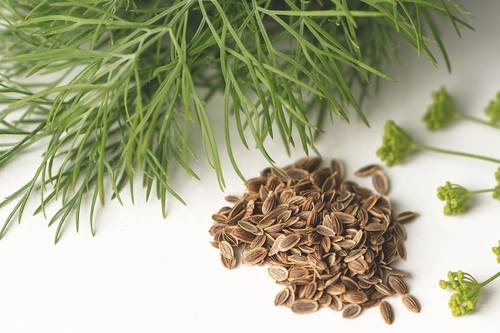
Pharmaceutical preparations based on fennel
The pharmacy chain sells ready-made “dill water” prepared from fennel essential oil. In addition to the fact that it helps relieve intestinal spasms, improves the baby’s digestion, it has antimicrobial properties, and also contains useful microelements and vitamins for the child’s body. Sold in 100 ml bottles, stored for up to 30 days.
The pharmaceutical industry offers tea in granules or bags, as well as a fennel-based drug - Plantex. They can be used from the first day of a baby’s life. There are no flavorings or dyes in the composition. The dosage and method of preparation are indicated on the packaging.
Photo gallery: drugs for newborns
Fennel tea in granules is made from natural raw materials and is suitable for babies from the first week of life. Plantex is used for the treatment and prevention of spastic pain in the intestines, during the transition from breastfeeding to breastfeeding in newborns and older children. Pharmacy-prepared dill water is a solution consisting of water and fennel essential oil
Before giving your baby fennel-based products, you should definitely consult your pediatrician.
Review of pharmaceutical products
The variety of manufacturers of medicines for colic in newborns does not have a large selection.
There are several companies that produce ready-made dill water to help young mothers.
Korolev-farm
The Russian manufacturer produces the medicine in a 50 ml bottle. Composition:
- glycine;
- fennel extract;
- vitamin B
To use the drug you will need water at room temperature. The dosage is described in the instructions for use.
Once opened, the solution can be stored in the refrigerator for one month.
Trav-in
“Trav-in” is an Indian-made drug with a volume of 120 ml. The medicine for newborns and mothers contains:
- deionized water;
- glycerol;
- sucrose;
- fennel oil;
- bicarbonate of soda;
- anise and peppermint oils.
No water is needed to dilute this product. Its dosage is prescribed in the instructions and varies according to the age of the child.
Baby Calm
Baby Calm dill water is produced in Canada. Bottle volume 50 ml.
The composition includes essential oils of fennel, anise, mint and glycerin.
Before use, be sure to dilute the concentrate in water. The drug is stored for 30 days after opening.
To prevent an overdose, read the instructions carefully.

Plantex
“Plantex” is a drug packaged in 5 g sachets. To use a portion of granulated medicine, you need water or milk at room temperature. Compound:
- dry fennel seed extract and essential oil;
- glucose;
- lactose;
- acacia gum.
Price
Dill water, produced to order in the prescription department, costs approximately 170 rubles per 100 ml bottle.
The price of concentrated medicine packaged at the factory ranges from 150 to 200 rubles per bottle.
Features of application
In the first days of taking any of the chosen remedies should be given very carefully - only 1 tsp. in a day. It is necessary to check how the child’s body reacts to the drug; if there are no unpleasant manifestations, the dosage is increased.
The tea has a pleasant sweetish taste, and kids take it without problems. Newborns are given it 3 times a day, 1 tsp. in between feedings. Infants - up to 6 times a day. The prepared solution can be given in a teaspoon or added to breast milk for children up to one year old.
It should be remembered that the dosage of pharmaceutical drugs differs from the composition prepared at home. Therefore, before giving tea to your baby, you must carefully study the instructions.
The decoction can be stored in the refrigerator for up to three days. Newborns should be given only freshly prepared solution.
Regular dill can also help cope with colic.
Its seeds are also rich in minerals and vitamins, which are beneficial for the child's body. It differs from fennel in the composition of essential oils. While dill also helps with intestinal immaturity and excessive gas in babies, fennel is better for tummy cramps and bloating.
It is worth considering that it is impossible to guarantee 100% relief from unpleasant symptoms. In addition, the effect of using dill water may be short-lived. Therefore, parents should closely monitor the baby’s condition in order to take appropriate measures and alleviate his condition if necessary.
Cooking processes
You can prepare a fragrant, healthy drink very quickly, which is a big plus. After all, when a child is tormented by something, he is capricious, there is no way to leave him alone, and you want to relieve him of unpleasant sensations as quickly as possible. To prepare you will need:
- In a children's container, bring water to a boil;
- Place a tea bag (with herbs) in a cup, pour 200 ml of boiling water;
- Cool to 37°, it is better if the drink is infused for 5 minutes before drinking, then it can bring maximum benefit;
- Pour into a baby bottle, give to the baby, monitor the norm.
If you are preparing a drink from granules, then you will need 1 tsp per 100 ml of water. granules The only difference is in the proportions and that when preparing granules there is no need to infuse the drink.
Contraindications and possible side effects
Although dill water is well tolerated by children, in some cases adverse reactions are possible in the form of:
- skin rash;
- redness.
Allergic reactions may not appear immediately, but only on the 4th or 5th day. To track the child’s reaction, a young mother should not rush and introduce new foods into the diet.
Contraindications to taking fennel-based tea are individual intolerance to the drug. If any allergic reactions occur, you should immediately stop using the drug and consult a doctor for advice.
Contraindications and possible harm when used
Fennel is a virtually harmless plant. It is believed that when used correctly in doses prescribed by a doctor, it cannot cause any harm to the health of either newborns or older children.
However, fennel tea should not be given to newborns under 2 weeks of age. During this period, the intestinal microflora is formed and its work is established. Otherwise, the newborn’s digestive system will get used to the stimulating properties of tea and will not be able to function fully without it.
Neither the herb nor the root of the plant in any form should be given to a child in the first months of life: a large amount of essential oils and organic acids can cause serious harm to fragile digestive organs, cause a severe allergic reaction and poisoning.
The only exceptions are tea, infusion and decoction based on fennel: in this form, the spice will not harm the baby’s digestive organs, but, on the contrary, will improve the digestion of food, relieve pain and reduce gas formation. Up to 7 months, only fennel tea can be given, then the boiled root of the plant can be introduced into the diet along with the first complementary foods.
Infants (from a month to a year) may suffer from exceeding the daily dosage of drinking tea: this leads to weakened digestion and frequent constipation after stopping drinking fennel tea. Fennel root must be introduced into the diet carefully, observing the body's reaction: whether allergies or problems arise with the passage of food through the digestive tract.
Frequent consumption of fennel by children over the age of one year leads to diarrhea.
Contraindications to the use of fennel in any form for all ages:
- individual intolerance (allergy);
- presence of epilepsy or risk of developing this disease.
But, despite the many positive properties of the plant for children in their first year of life, fennel may be prohibited. The use of decoctions based on this herb will be prohibited in the following cases:
- if you have an allergic reaction to this plant;
- with diagnosed epilepsy.
That is why, before starting this treatment for colic, you need to consult with the pediatrician who is monitoring the child.
Despite the fact that the fennel-based drink is quite healthy, it is not recommended to abuse it. Before using it for preventive purposes in newborns, you should consult your pediatrician. Perhaps the baby has pathologies for which this spicy crop cannot be used (for example, heart problems or a predisposition to epilepsy).
Individual intolerance to the drug may occur, manifested by allergic reactions. This is observed mainly in cases where seeds are taken from the garden to make tea. Special children's drinks based on fennel extract, such as those described above, have a soft composition that is very well accepted by the little body.
If you notice a negative reaction from your baby to tea, you will have to give up this drink after consulting with your doctor about what drug can replace the fennel product.
Video: Dr. Komarovsky about colic in babies
Fennel acts as a kind of “ambulance” for digestive problems and colic in babies. However, we should not forget that this is not a panacea for all ills. If the remedy does not help cope with unpleasant symptoms, you should immediately consult a doctor for help.
People first started talking about the beneficial properties of fennel back in ancient Greece. Greek doctors believed that a drink with this plant helps the child strengthen the nervous and immune systems. And since fennel has a pleasant taste and aroma, it is easily accepted by newborns and acts gently and soothingly if the baby is worried about something and cries.
It's no secret that the main problem for babies from birth is intestinal colic. Fennel tea is the best remedy for newborns to help cope with digestive system problems. Also, in addition to normalizing the functioning of the gastrointestinal tract, fennel ensures good absorption of calcium, which contributes to the formation of the child’s skeletal system. And young mothers should know that the use of fennel during breastfeeding stimulates and improves the lactation process.
Composition and properties of fennel
In appearance, fennel inflorescences resemble umbrellas containing seeds, and that is why it is extremely reminiscent of ordinary flowering dill. Its natural components have a beneficial effect on the functioning of the gastrointestinal tract and normalize digestive processes. Fennel contains a large amount of vitamin C, B vitamins, as well as carotene, vitamins E and PP. The fruits of the plant, which are usually used for medicinal purposes, contain aromatic esters and fatty oils. During the period of use, fennel has antispasmodic, diuretic, choleretic, soothing and antibacterial effects.
Ways to use fennel for newborns
Fennel is usually given to an infant in the form of dill water or plantex. Pharmacists usually call dill water a special infusion for the preparation of which fennel essential oil is used. You should be careful when using this drug. It is necessary to give it to the child, starting with several spoons a day, while carefully observing the reaction of the baby’s body. Sometimes a child may develop a rash, which in this situation is a signal to stop using this drug. But such a reaction is extremely rare. As a rule, fennel is well tolerated by newborns and after a while the child begins to pass gas, and his general well-being improves. Plantex, in turn, is sold in pharmacies in powder form and diluted with ordinary water according to the attached instructions.
Dill water at home
Dill water can only be found in pharmacies that prepare prescription medications. Tea brewed from fennel fruits has similar properties for a newborn. In turn, this medicinal plant is always available for sale in any pharmacy and therefore buying it will not be difficult. How to brew fennel for a newborn? You need to pour one teaspoon of chopped fennel fruit into one glass of boiling water. The tea should steep for 20-30 minutes, after which it should be strained and allowed to cool slightly. It is recommended for a newborn baby to drink fennel tea in small quantities. You can also add one tablespoon to milk or a specially adapted formula for infants.
Fennel for a newborn with colic is a kind of “first aid”. And thanks to its positive properties, it has practically no contraindications.
The main thing to know is that there are no hopeless situations, and young parents can almost always help their baby.
Colic haunts many babies in the first months of life. They are associated with immature gastrointestinal microflora. Insufficient food processing leads to increased gas formation. Air bubbles stretch the intestinal walls, causing severe pain to the baby. By 5-6 months, colic goes away. Before this, you can help the baby with massage and carminatives. Fennel for newborns is one of them. We will understand the rules for using this product, and also find out whether an allergy may occur to it.
How to use fennel for colic
Doctors often recommend taking fennel-based tea to nursing mothers. The product allows you to increase the production of breast milk and improve lactation. Fennel can be consumed by pregnant women in small quantities for digestive problems or nervous tension. However, you should always take into account individual intolerance to the components of the plant, including when treating colic in newborns.
For babies, you can prepare a fennel infusion yourself using pharmacy raw materials. To do this, pour a teaspoon of chopped dill fruits into a glass of boiling water and infuse the liquid for half an hour. After straining, the cooled dill water can be given to the baby from a bottle or using a spoon. It is best to give an infusion of fennel fruits between feedings, because the remedy reduces appetite. It is enough to consume one tablespoon of the drug per day to notice a positive effect.
To save time, you can use medicines made from fennel. This could be ready-made tea with pharmaceutical dill, or Plantex. Such preparations do not require infusion or straining; they are made taking into account the dosage.
Fennel can not only be given to newborns to drink for colic, but also dill water can be used to treat skin inflammation and diaper rash. For these purposes, fennel infusion is added to bathing water, and areas with rashes are wiped with cotton pads soaked in dill water.
Useful plant
Fennel is a herbaceous plant belonging to the Umbelliferae family and is a relative of dill. All its parts (root and green shoots) have a spicy anise aroma and can be eaten. Fennel contains vitamins (PP, E, K, A, C), essential oil, glycosides and mineral components.
The plant is very useful for infants, it:
- improves food digestion
- relieves spasm of intestinal smooth muscles
- eliminates increased gas formation
- calms the nervous system
- strengthens the immune system
Seeds, herbs, fruits (roots) and essential oil are used to treat colic. You can make a decoction, infusion or tea with them. Let's figure out how to prepare these drinks yourself. In addition, fennel baths are recommended for bathing infants with diaper rash and restless behavior.
Drink Recipes
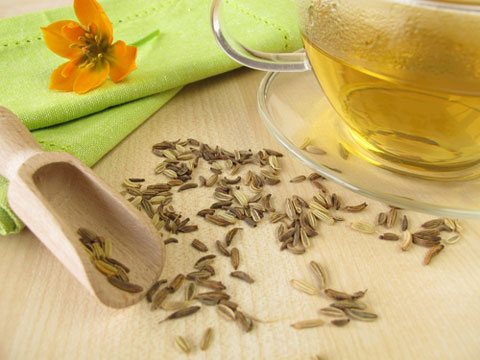
Tea
Children's fennel infusion (tea) is very simple to prepare. You need to take the seeds (2-3 g), crush them in a mortar and pour boiling water (200 ml). After 30-60 minutes, the drink should be filtered through a strainer or gauze and a little boiled water at room temperature should be added to it to again make 200 ml.
Decoction
A decoction is made from the fruits (roots) of fennel. 5 g of raw material should be finely chopped, pour 200 ml of boiling water, boil for 2 minutes and leave for 10 minutes. Then the drink needs to be strained and cooled to a comfortable temperature.
Infusion
The above-ground parts of the plant (herb) are also suitable for preparing an infusion. They can be brewed dry or fresh. 1 spoon of chopped herbs should be poured into 100 ml of boiling water, left for 1 hour and filtered.
Dill water
Fennel is most effective for newborns in the form of “dill water”. Despite its name, this water is made from essential oil obtained by distilling fennel seeds. In Soviet times, it could be purchased in almost all pharmacies, but now it has become less accessible. Water is produced under various brands, but is not cheap.
“Dill water” is prepared as follows: 0.05 g of fennel essential oil is dissolved in 1 liter of boiled (cooled) water. This medicine can be stored for about 30 days in the refrigerator, shaking and warming slightly before use.
Treatment rules
Fennel is considered a safe product for babies if consumed in a reasonable dosage. The only possible side effect is allergies in the form of rash and itching. Giving children's infusion or decoction must be done very carefully.
If you have tummy problems, fennel tea for newborns can be offered starting from the second week of life, after consulting with your pediatrician. On the first day, you are allowed to give the baby 0.5 teaspoon. If an allergy does not manifest itself, the dosage can be increased to 3 teaspoons per day: 1 spoon before each feeding. When the baby is one month old, the volume of infusion can be increased to 6 teaspoons per day.
An allergy to fennel sometimes does not appear immediately, but after 4-5 days of use. During this period, it is better for a nursing mother not to introduce new foods into her diet so that the baby’s reaction can be clearly monitored.
If negative consequences occur, you should immediately stop giving the baby the solution. If the allergy bothers him very much and does not go away for a long time, he may need to use antihistamines prescribed by a doctor.
Another important point in using fennel drinks is that it is better to prepare them immediately before use (the exception is “dill water”). The remaining baby tea can be drunk by the mother. This will have a beneficial effect on lactation and the functioning of its gastrointestinal tract.
Fennel - first aid for colic in newborns
Colic haunts many babies in the first months of life. They are associated with immature gastrointestinal microflora. Insufficient food processing leads to increased gas formation.
Air bubbles stretch the intestinal walls, causing severe pain to the baby. By 5-6 months, colic goes away. Before this, you can help the baby with massage and carminatives. Fennel for newborns is one of them.
We will understand the rules for using this product, and also find out whether an allergy may occur to it.
Useful plant
Fennel is a herbaceous plant belonging to the Umbelliferae family and is a relative of dill. All its parts (root and green shoots) have a spicy anise aroma and can be eaten. Fennel contains vitamins (PP, E, K, A, C), essential oil, glycosides and mineral components.
The plant is very useful for infants, it:
- improves food digestion
- relieves spasm of intestinal smooth muscles
- eliminates increased gas formation
- calms the nervous system
- strengthens the immune system
Seeds, herbs, fruits (roots) and essential oil are used to treat colic. You can make a decoction, infusion or tea with them. Let's figure out how to prepare these drinks yourself. In addition, fennel baths are recommended for bathing infants with diaper rash and restless behavior.
Tea
Children's fennel infusion (tea) is very simple to prepare. You need to take the seeds (2-3 g), crush them in a mortar and pour boiling water (200 ml). After 30-60 minutes, the drink should be filtered through a strainer or gauze and a little boiled water at room temperature should be added to it to again make 200 ml.
Infusion
The above-ground parts of the plant (herb) are also suitable for preparing an infusion. They can be brewed dry or fresh. 1 spoon of chopped herbs should be poured into 100 ml of boiling water, left for 1 hour and filtered.
Treatment rules
Fennel is considered a safe product for babies if consumed in a reasonable dosage. The only possible side effect is allergies in the form of rash and itching. Giving children's infusion or decoction must be done very carefully.
If you have tummy problems, fennel tea for newborns can be offered starting from the second week of life, after consulting with your pediatrician. On the first day, you are allowed to give the baby 0.5 teaspoon.
If an allergy does not manifest itself, the dosage can be increased to 3 teaspoons per day: 1 spoon before each feeding. When the baby is one month old, the volume of infusion can be increased to 6 teaspoons per day.
An allergy to fennel sometimes does not appear immediately, but after 4-5 days of use. During this period, it is better for a nursing mother not to introduce new foods into her diet so that the baby’s reaction can be clearly monitored.
If negative consequences occur, you should immediately stop giving the baby the solution. If the allergy bothers him very much and does not go away for a long time, he may need to use antihistamines prescribed by a doctor.
Another important point in using fennel drinks is that it is better to prepare them immediately before use (the exception is “dill water”). The remaining baby tea can be drunk by the mother. This will have a beneficial effect on lactation and the functioning of its gastrointestinal tract.
Soothing baths
The use of fennel is not limited to internal use. Adding its infusion to bathing water has a calming effect on the baby’s nervous system and has a beneficial effect on the condition of his skin - relieves irritation and reduces diaper rash.
Bath solution usually includes not only fennel, but also other medicinal herbs. Here are some recipes:
- For bathing with nervous excitability. You will need fennel grass, chamomile flowers 1 tablespoon each, marshmallow, wheatgrass and licorice roots 2 tablespoons each.
- For bathing with skin problems. You need oregano, thyme, and crushed fennel seeds, 2 tablespoons each.
The infusions are prepared as follows: the raw material must be poured into a jar, poured with a liter of boiling water, left for several hours, filtered and added to the bath.
Fennel tea for newborns is a useful and safe remedy for colic caused by bloating. In addition, the infusion of this plant is suitable for bathing a baby; it will help soothe him and remove diaper rash. But introducing herbal medicine into the diet and performing water procedures with it should be done with caution; some children are allergic to it.
Source: https://ogrudnichke.ru/lechenie/fenxel-dlya-novorozhdennyx-instrukciya-kak-zavarivat-chaj.html
Pharmacy drugs
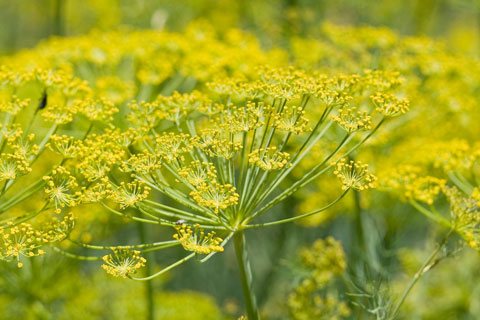
Preparations for infants containing fennel are presented in the form of teas, “dill water” and powders for preparing a solution. They are sold in pharmacies.
Fennel tea for newborns is available in the form of granules (“Hipp”) and filter bags (“Bebivita”). Instructions for preparing the drinks are described on the packages. Usually you need to brew 1 teaspoon or 1 tea bag in a glass of boiling water, leave for 15-20 minutes and cool. The dosage does not differ from that given above. It is important to choose products without artificial additives and sugar or its substitutes.
“Dill water” sold in pharmacies may have different concentrations of essential oil. Its use (quantity and frequency) is determined by the instructions.
The most famous children's preparation from fennel is Plantex. The medicine sachet contains dry powder from fennel fruit extract, essential oil, fragrance, lactose and glucose. The instructions inform you about this method of preparation: one sachet is dissolved in 100 ml of milk or boiled water and shaken. This children's solution must be divided into 3 doses.
Types of teas
Many people’s “relative” of dill grows in their garden beds. Housewives collect ripe fennel seeds so that they can prepare a healing infusion at any time. But most city residents do not have this opportunity, so they are forced to buy raw materials for tea. Some will make a purchase from a grandmother-herbalist selling at the market, others will go to a pharmacy or store where the spicy crop is sold in civilized packaging.
These teas are more preferable for children, since the raw materials have undergone all the necessary processing and are supplemented with useful components, taking into account the child’s body. Among them there are 2 most popular products.
- Hipp tea is a drink with a pleasant taste and smell, made from varieties of culture specially grown for this purpose. This plant contains much less estragole than garden varieties, which makes the product more acceptable for newborns. But along with fennel, hipp contains dextrose, which is necessary for the baby for normal development.
- Humana Children's Herbal Tea also contains herbal ingredients. Compared to hipp, this product also contains lactose and maltodextrin, which can improve the intestinal microflora. So Humana is also an excellent remedy for dysbiosis.
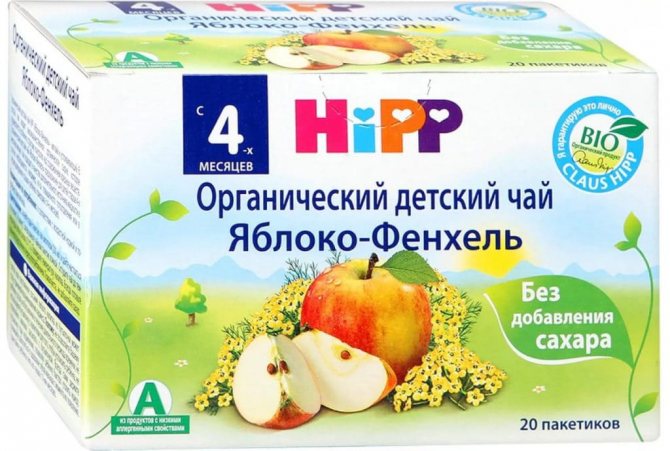
Fennel tea for newborns hipp
You can also look for some other tea composition on sale, similar to hipp. In this case, you should pay attention to the description of the composition - it should not contain any dyes, preservatives, or sucrose. You can store opened packaging at home for no more than 3 months.
We suggest you familiarize yourself with: Drops on the withers against fleas and ticks for dogs and cats
Soothing baths
The use of fennel is not limited to internal use. Adding its infusion to bathing water has a calming effect on the baby’s nervous system and has a beneficial effect on the condition of his skin - relieves irritation and reduces diaper rash.
Bath solution usually includes not only fennel, but also other medicinal herbs. Here are some recipes:
- For bathing with nervous excitability. You will need fennel grass, chamomile flowers 1 tablespoon each, marshmallow, wheatgrass and licorice roots 2 tablespoons each.
- For bathing with skin problems. You need oregano, thyme, and crushed fennel seeds, 2 tablespoons each.
The infusions are prepared as follows: the raw material must be poured into a jar, poured with a liter of boiling water, left for several hours, filtered and added to the bath.
Fennel tea for newborns is a useful and safe remedy for colic caused by bloating. In addition, the infusion of this plant is suitable for bathing a baby; it will help soothe him and remove diaper rash. But introducing herbal medicine into the diet and performing water procedures with it should be done with caution; some children are allergic to it.
Fennel copes so well with a number of children's problems that it can be used without fear, naturally, following the instructions and dosages according to age.
Newborns
General benefits of fennel for the baby's body
Indications for use:
- Cough.
- Headache.
- Gastrointestinal spasm.
- Colic in newborns.
- For painful periods.
- To relieve constipation and nausea.
Contraindications
Fennel tea is contraindicated for those who have an individual intolerance to fennel or its constituent components.
Special instructions for use
Fennel tea is a harmless product, so it can be consumed by pregnant and nursing mothers; it is not contraindicated for people with diabetes. Only those who suffer from intestinal disorders (diarrhea) should be careful with fennel.
Fennel does not need to be boiled or infused, but simply brewed like regular tea.
This spicy culture is similar to dill, and is used not only in cooking - it is also present in folk recipes. Adults drink teas with its seeds, trying to get rid of stomach cramps, or going on a diet to lose weight. But fennel tea is mostly used for newborns.
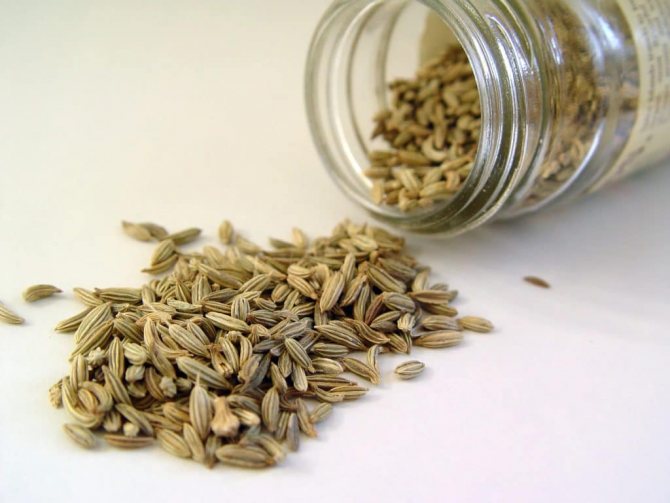
Benefits of fennel
This culture contains useful components such as sugars, carotene, protein, essential oils, and the prebiotic inulin. There is a large set of microelements and vitamins (the amount of ascorbic acid is especially large). This set has a beneficial effect on many aspects.
- The microflora in the intestines is normalized.
- Tea quickly relieves baby colic.
- Regular consumption of the drink maintains metabolic processes at the desired level.
- It also promotes good appetite.
- The drink is a good sedative for the nervous system.
- Fennel also helps strengthen the immune system of a growing baby.
All these properties of the healing drink will affect the newborn’s body if he is periodically given herbal spicy tea as a preventive measure.
We suggest you read: How much firewood is needed for heating a house in the winter?
How, besides relieving an attack of colic, will the plant be useful for infants?
- The use of fennel-based decoctions promotes better functioning of the child’s digestive system.
- When a spasm of intestinal smooth muscles develops, the plant safely removes it.
- Fennel decoctions improve metabolic processes and intestinal motility, and also help increase immune defense.
- The plant also acts as a good sedative on the child’s nervous system.
Benefit
Fennel is a real storehouse of nutrients.
The list is impressive: vitamins A, B1, B2, B6, B9 and PP, antioxidant - vitamin E, ascorbic acid (up to 90%).
In addition to the above: calcium and potassium, magnesium and copper, phosphorus and sodium, iron and manganese. Fennel seeds contain essential (up to 6%) and fatty oils, which give them a characteristic taste and aroma, flavonoids and carotene.
The nutritional value of fennel is as follows (content per 100 grams of product):
- Carbohydrates – 52.3.
- Proteins – 15.8.
- Fats – 14.9.
- Omega-9 – 9.91.
- Omega-6 – 1.69.
- Sterols – 0.066.
- Saturated fatty acids – 0.48.
Harm and contraindications
Drinking drinks with fennel does not harm the child's body. The only contraindication may be individual intolerance,
expressed in the form of intestinal disorders or allergic reactions (skin rashes, rashes, itching).

A preliminary consultation with your child’s pediatrician is required before introducing a new product into your baby’s diet!
How to use and for what?
For preventive purposes or for routine use
For preventive purposes, experts advise using fresh fruits.
A small spoon of finely chopped fennel is infused in boiled water (200 ml) for half an hour, then cooled and given to the baby in a volume of 10-15 ml.
For colic
The so-called “dill water”, which in fact turns out to be fennel essential oil mixed with water, will help cope with a child’s colic. 0.05 oil is dissolved in a liter of cooled boiled water; it needs to be warmed up a little before use.
This composition can be stored in the refrigerator for 2-3 weeks. In all other cases, drinks must be prepared immediately before use.
For vision
The plant's help in the treatment of glaucoma has been proven for a long time
. In addition, it can be dripped into the eyes or applied as compresses - the antioxidants contained in the plant relieve inflammation.
Rinse fresh leaves thoroughly, chop finely, pour a glass of boiling water and leave covered for 15-20 minutes. Moisten cotton pads with the cooled solution and apply to the eyes for several minutes.
To improve digestion
To stimulate digestion and improve liver function, you should prepare the following drink:
mix chamomile flowers and fennel seeds in equal parts, add a glass of hot water, leave for 15-20 minutes. The seeds should first be crushed in a mortar, removing the outer shell.
For immunity
5 grams of fresh or dried fruits are boiled for 30 minutes over low heat, the broth is filtered, cooled and given to the child 3-4 times a day (10 ml).
For the flu
Here’s how a mother can overcome the flu in a child:
Pour crushed seeds (5 grams) with water, cover with a saucer and leave to steep for 10 minutes. Give the child water for several days, observing proportions according to age.
For a cold
The following recipe will help you cope with cold symptoms: pour 2-3 grams of crushed seeds into a glass of hot water and leave to steep for 25-30 minutes. If you have essential oil on hand, you can also use it, but the dose should be carefully measured - 0.5 g per liter.
Where to get?
You can purchase the plant in the seasoning section of a large grocery store or at a pharmacy.
. The latter option is preferable: you can be sure that the collection and preparation of raw materials is carried out in accordance with all the rules, and expiration dates are strictly controlled. The stems of the plant should be elastic and hard to the touch, the seeds should be brown, with smooth, not dried out edges, and the aroma should be fresh, with a clearly noticeable note of anise.
A package of common fennel weighing 100 grams costs 140-150 rubles. The plant should be stored in a glass or porcelain bowl in a dry, dark place. Polyethylene cannot be used for this!
Purchase
Packaged herbal Hipp (Hipp) for a child
Tea from the Hipp brand contains exclusively fennel fruits.
It contains no sugar, flavorings or preservatives. It can also be given to newborns, but it is important to follow the prescribed dosage:
- Bagged herbal tea has been developed for newborns (30 bags per package). A child can be given no more than 100 ml of drink per day.
- Starting from 1 month, you can drink a drink made from fennel extract (100 g per package). The recommended daily dose is 150 ml per day.
- After 4 months and up to a year - granulated tea with a small amount of sucrose, which is convenient to dissolve in water. Sufficient volume – 200 grams.
- One-year-old toddlers are allowed to give 2-4 tea cups per day.
The drink is easily digestible and is made from products with low allergenic properties, however, judging by reviews, in half of the cases it does not have the desired effect
and parents have to resort to additional measures. The average price in Moscow and St. Petersburg is 230-250 rubles.
"Granny's Basket"
The composition of “Babushkino Lukoshko” tea is similar to the product described above and there are no additives. The highly crushed raw materials are packaged in convenient sachets (1 gram of powder each) and are easily brewed.
Consumers like “Babushkino Lukoshko” for its effectiveness, affordability and natural composition.
The cost of packaging in stores ranges from 90 to 110 rubles.
Humana
Excellent quality – that’s what can be said about this product from Germany. Manufacturers specializing in the development of baby food for more than 60 years have created a mixture of high-quality materials - caraway extracts, fennel oil and maltodextrin.
The drink has a mild pleasant taste, helps reduce intestinal spasms and colic,
reduces gas formation in the intestines. One caveat - it can only be used from the first month of a child’s life.
Important!
Since lactose is also included in the composition, this tea is strictly contraindicated for children with intolerance to this substance.
To prepare, you need to dissolve 1 teaspoon of the dry mixture in 100 ml of warm boiled water (up to 37 degrees) and stir thoroughly.
Bebivita (Bebivita)
Instant tea, which comes in pale yellow granules,
or in bags. Contains a small percentage of dextrose. It has a pleasant taste and smell, but the shelf life of an open tube is limited (2-3 months). According to the instructions, the proportions are as follows:
- Babies under one year old need to dissolve 3.75 g. (1 tsp) in 100 ml of warm water.
- For older children, the amount increases: 2 spoons per 200 ml of liquid.
The average price in pharmacies in St. Petersburg and Moscow is 150 rubles per pack.
Fleur Alpine Organic
Another tasty helper in the fight against colic. One filter bag contains 1.5 grams of fennel fruit; there are 20 such bags in a package. There are no sugar or other excipients. This tea can be given to a child from one month of age.
How to brew for newborns: pour 1 filter bag of fennel tea with a glass of hot water (200 ml) and brew for 5-10 minutes. It is not recommended to give babies under 5 months of age more than 50 ml of tea per day; in the future, the amount should be increased to 200 ml.
Attention!
A child up to one year old can be given drinks containing fennel every day for 2-3 weeks, after which a break for the same period is required.
The average cost per package is 200 rubles.
Seeing your child's serene smile is the greatest happiness for parents. Therefore, when faced with adaptation problems in new conditions for your baby, do not panic. Pay attention to the products that have been tested by time and many generations of moms and dads. Fennel is an indispensable medicinal drug, affordable and safe, for your baby.
Excellent humana tea with fennel
For many years, people have used fennel and fennel teas to relieve cramps, colic, and other digestive problems. Humana tea for a newborn baby becomes a faithful assistant immediately after birth or from the moment colic begins to occur. Humana fennel tea was created specifically to solve such problems, and it can also be used to prevent dysbiosis, which has recently increasingly worried newborn children.
This tea contains maltodextrin and lactose, and they are responsible for the normal development of bifidobacteria. In addition, humana tea, which contains fennel, is very rich in vitamins and nutrients, which is especially valuable for a newborn. It is worth noting that fennel can be taken in any form and it will bring great benefits not only to the body of a newborn baby, but also to an adult.
We suggest you read: How much does dill water cost for newborns?
